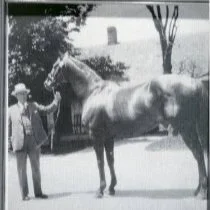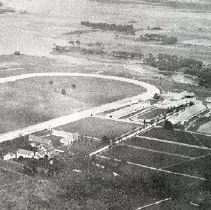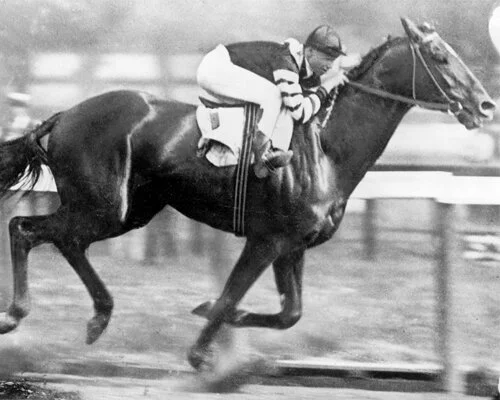Man O’ War
The Champion Who Lived At Riddle Farm
by George M. Hurley, 1992
Man O'War with Riddle Farm Manager, William Whaley
During this year of the 250th anniversary of Worcester County, it is interesting to recall an era that occurred here that created world wide interest and brought prestige and glory to the area as well as contributing significantly to our economy by employing hundreds of persons. There was a time, nearly seventy five years ago, when Worcester County was one of the centers of American thoroughbred racing. Many champions and winners were trained here. None however, surpassed the legendary race horse, Man O' War.
Three miles west of Ocean City, Maryland along the north side of U.S. Route 50 one may still find the famous Glenn Riddle Farm. It is immediately adjacent to the present day Del-Mar-Va Downs racing complex. Unlike that active facility however, horses are no longer quartered on the Riddle farm. The large old gracious training barns with their pale yellow sidings and green roofs and a multitude of similarly colored support buildings sit silently awaiting the advent of progress. Along one lane encroaching ivy atop a large arch hides a barely discernible sign that reads "MAN O' WAR." They bear mute testimony to the bygone glory of a big time racing lineage that had its beginning in 1918 and quietly came to an end during the 1950's. But during that period, the endurance and blinding speed of the big chestnut horse named Man O' War and the horses that he later sired, electrified racing fans across the country.
Possibly the most famous race horse in history was born on March 29, 1917 in Lexington, Kentucky. His owner was August Belmont, son of the famous financier for whom the Belmont Stakes, and Belmont Park in New York was named. Belmont had carefully planned for the colt by breeding from pedigreed Arabian stock on the sire's side to the most respected English stock on the dam's. But he would not realize the results of his planning. America had entered World War I which was engulfing the globe and Belmont, at age 65, volunteered to serve. Sent to France by the U.S. Army his duties included procuring mules for the service. Mrs. Belmont named the new foal "My Man O' War" in honor of her husband. As the war dragged on, Belmont cabled home for his wife to sell the 1917 string of yearlings including Man O' War, ("My" had been dropped.)
Samuel Riddle of Glenn Riddle, Pa. purchased the colt along with several others. Riddle was a textile magnate and relatively new to big time racing but he was immediately impressed by the credentials and looks of the big chestnut colt. His intuition would not go un-rewarded. Soon thereafter he had the colt shipped by train to the Riddle farm in Worcester County, Maryland. By the spring of 1919 the blinding pace that Big Red, (as he had been nicknamed,) was setting in his training times indicated to Riddle that he had acquired an exceptional horse.
In his first official race of 1919, Man O' War won so handily in a field of outstanding young thoroughbreds that his jockey was standing straight up in the stirrups looking back at the field as he crossed the finish line. Where ever the big colt raced that year he won, and it is reported that he didn't just shave existing North American records, but smashed them. In one race at Belmont Park in 1920 he won by 100 lengths! His presence guaranteed unprecedented attendance for he seemed to electrify racing fans.
Security details had to constantly protect the horse against fans trying to pull keepsake hairs from his body, while constant threats on his life made it necessary to employ detectives to guard him at all times. At one time, Riddle was offered a legitimately signed blank check by a Texas millionaire to be made out in any amount for the big horse. Riddle refused to sell. He also refused to run him in the Kentucky Derby for training reasons. Later that year however he soundly trounced the winner of the Derby as well as wining the Preakness and the Belmont Stakes.
Man O' War went on to win every race he was ever entered in excepting one, establishing records that stood until the invention of the aluminum horse shoe and horse racing track surfacing changed. The only race that he ever lost was ironically to a horse named Upset; though he went on to convincingly beat this horse several times thereafter. That one loss is surrounded by an air of mystery and subtle hints of possible wrong doing on the part of the track officials. His last official race was run in October of 1920 after Riddle had decided it would hurt the horse to have to carry the ever increasing handicap weight that was being assigned to him. In this last race he easily ran away from the winner of the 1919 Triple Crown in a match race.
In retirement, Man O' War continued to set records by siring champions. Of the almost 400 foals that he sired, more than 200 of them became champions in their own right. Two of the more famous were Battleship, who won the English Grand National Steeplechase, and War Admiral, who was the 1938 Triple Crown winner. He died of a heart attack in 1947 at Riddle's Faraway Farm in Kentucky, having lived for thirty years. His groom, (who died a few days before him,) once described him as "de mostest hoss dat ever was."
Across from the farm is a narrow dirt road called Holly Grove. About a half mile down this country lane one will find the bed of a former railroad. The tracks are gone now. Holly Grove is shaded by forests of gum, oak and holly trees. If one stops their car and gets out they will immediately be struck by the stillness. In the silence one can imagine a train of long ago arriving on the special siding. Large numbers of local people would gather to watch the arrival of the champions and the new foals. High spirited thoroughbred horses, each carefully guided by its own groom were led down the ramps while trainers nervously looked on. The whole procession would start the short walk towards the farm along the sandy road with the grooms quietly talking to the horses to put them at ease. Each year the number of people who witnessed this annual event grows smaller.
Soon only the trees will remain. The Riddle heirs reportedly have recently sold the 1500 acre training farm with its one mile racing oval to Arizona investors. Permits are presently being processed for a planned community complete with golf course and marina on the adjacent creek. Man O' War and the Glen Riddle Farm will be remembered however as true gems of the rich heritage of Worcester County, Maryland.
Fire Destroys Riddle Farm Home, April 1969
One of the Shore's most famous showplaces, the Riddle Farm mansion, was destroyed by a fire of undetermined origin about 7 Monday morning, and after firemen from Berlin, Ocean City, Showell and Bishopville battled the blaze for three hours, only the walls of the 100 year old frame house were left standing.
The interior, filled with priceless antique furniture and racing memorabilia, was completely gutted as the trucks ran out of water and had to pump it from a pond several hundred yards away.
A major loss to owner Walter Jeffords, Jr. of Newtown Square, Pa. and to the our local communities.
Riddle Farm Horse Track
Man O’ War winning the Belmont Stakes, 1920.




